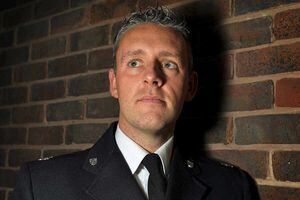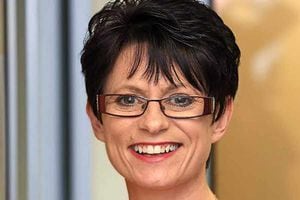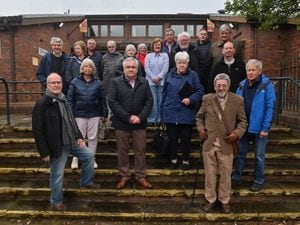Tackling child sex abuse is 'number one priority' for Telford police chief
Telford's top police officer has reiterated his commitment to tackling child sexual exploitation, describing it as his "number one priority".

And he has rejected criticism of the borough for having high rates of child sexual offences and wishes to clarify that very few of these offences are indeed child sexual exploitation.
The high figures, he believes, are down to higher levels of reporting and partnership working – which he believes should be seen as a positive.
Tom Harding has been superintendent in Telford for five months and was previously the Detective Chief Inspector in the borough for a year.
Between April 2014 and September 2016, where the offender is known:
37 per cent of offences are committed by offenders under the age of 15 on victims under the age of 15
52 per cent of child sexual offences are committed by offenders under the age of 18 on victims under the age of 18
89 per cent of offenders are white males
Two per cent of offenders are Asian; 1 per cent Afro-Carribean; 2 per cent other
67 per cent of offences are white males on white females; 11 per cent are white males on white males
Supt Harding said that since Operation Chalice – which saw seven men jailed for a total of 49 years for running a child sex ring in the town in 2013 – a significant amount of time and resources had been put into investigating child sexual offences and exploitation in Telford.
Government figures had previously suggested there are more reports of children being abused in Telford than anywhere else in the country, although this is not now the case, but Supt Harding has challenged the negative attitude towards the borough.
After analysing the government data on the nature of child sexual offences in Telford, Supt Harding said the figures paint a surprising and changing picture. He said the need to publish this data in more detail came about as a result of the increased commentary on the issue in Telford both locally and nationally, including the recent visit of the EDL, which said it targeted the borough specifically to highlight Muslim grooming gangs despite there being no evidence to support this as a continuing problem.
But the figures show that perception is not based on reality and Supt Harding said he wanted to "dispel the myths" surrounding the crime, and show the ongoing work that police are doing to make sure children in Telford are kept safe.
He said that the public perception that gangs of Asian men were going around the borough grooming children and responsible for the majority of child sexual offences could not be further from the truth, with the reality being much more complex.
New figures, first revealed by Police and Crime Commissioner John Campion at a Telford & Wrekin's full council meeting earlier this month show that in 37 per cent of Telford's child sexual offence cases, both the offender and the victim are under the age of 15.
In 54 per cent of cases, both parties are under the age of 18, while 89 per cent of offenders are white males, just two per cent are Asian males.
Social media is also increasingly a factor in sexual offences against children, with 41 per cent of child sexual offence cases recorded involving victims under 16 having no physical meeting or contact between offenders and victims.
He said: "With the systems and intelligence processes in place identifying an organised gang of males going around Telford exploiting girls would be easier to identify than the hidden offending which takes places across the country across all sections of society."

And he said people shouldn't see Telford's high figures as a bad thing, as the figures show that more people are reporting the crime, making it easier for police to investigate and tackle the problem head on.
He said police had seen a increase in both recent offences and those from the past being reported which suggests that it is not a case of more children being offending against, but rather that the public are now coming forward to report abuse.
He said: "As the policing commander I would rather have higher levels of sexual offences reported because it allows us to support victims, directing them to support services but also to deal with sexual offenders in the borough.
"Importantly it shows victims of these crimes they are not alone."
He said cases are prioritised on the risk they pose, making child sexual exploitation always one of the highest importance to investigating officers, who want to make sure young people in the borough are protected.
"Locally we are aware of CSE and have been for some time learning a significant amount from Operation Chalice as to how offenders seek to abuse victims but also how we can work to reduce the vulnerability of potential victims.
"We continue to work on a daily basis with our partners especially the local authority and Telford & Wrekin is often held up as one of the areas of best practice for other areas to come and look at.
"Saying that, political pressure and the political climate have no impact, quite rightly, on how the police work locally."
A petition has been launched online calling for an independent review into CSE in Telford similar to one that was undertaken in Rotherham, after MP Lucy Allan called for it. But Supt Harding has said a similar investigation would not work in Telford because of the nature of the crime.
Supt Harding personally spent time analysing the latest figures andhe expects Telford to see a further rise in reports of all sexual offending, as more people come forward and investigations begin to show results.
Supt Harding also gave an insight into how one victim can lead to multiple recording of crime. In one investigation that West Mercia worked on in Telford, a girl had shared images of herself on her phone.
While looking into the crime, police actually found she had shared images with 25 different men, which is recorded as 25 separate crimes, this one investigation would show as a spike in reported crimes, but with one victim – something that may not be fully understood at first glance from the figures.
He said for people working in criminal investigation, their workload has changed dramatically in the past 10 years. Where once the majority of their work was focused on robbery and violence, the majority now revolved around sexual offences. He said a recent request to the force for more resources to tackle CSE has been approved meaning more detectives will be focused on sexual offending against children.
The changing nature of the crime also poses new issues for police, who see more and more young people exchanging images online – often never meeting the recipient.
Supt Harding said: "These figures coincide with a shift in offender behaviour. We have seen a significant jump in the amount of recorded crime that involves social media and online communication. In many cases, the offender and the victim never meet."
Offenders who have victims in Telford may live anywhere in the world and this information is shared between law enforcement agencies worldwide.
And as the trend of "sexting" increases among young people, many don't realise that if they are 15 and share a picture of themselves, they are actually committing an offence of sharing an indecent image of a child even if it is with another child.
Police and partners are doing more work in schools to educate them about the dangers but Supt Harding said he is keen to ensure that children are not criminalised if they are not genuinely offending and do not pose a risk.
He said: "We are careful not to criminalise these children because it is not appropriate. If we recorded them as a suspect on our systems it would show up in future when they tried to apply for a job which required a check such as a teacher or police officer and so on."
Mr Harding said he would encourage people to come forward and report crime, even if they are unsure whether it would ever lead to a conviction. He said: "If we have two or three separate people come to us making allegations about one person, their independence from each other and the similarities in their accounts is often incredibly strong evidence from which we can obtain convictions. People get caught up in the forensic element, because that is what we see on television but many cases, especially those non-recent reports, have no forensic evidence at all but still result in convictions.
"Where we can't progress to conviction, if we're aware of it, we can make sure that person is getting the proper help and support they need and that the suspect is appropriately monitored."
Supt Harding said officers had been undertaking a number of investigations using all means available to them including covert techniques, which show the force's dedication to work in this area.
Mr Harding said: "As with the situation in football we are seeing in the headlines at the moment, it has taken a lot of courage for those people affected to come forwards and we don't underestimate the impact reporting sexual offences has on the individual involved.
"But what we can promise is we will do our very best to look after you and your support in turn can enable us to look after others who maybe at risk. We would encourage others to come forward so they can get the help and support they need."
We must pull together to tackle issue

By Police and Crime Commissioner John Campion
I wrote on this subject in the Shropshire Star back in September and pledged that this would remain a top priority for myself and the police.
Three months later, those promises have been kept and I want to reassure our communities that will continue to be the case. I have prioritised and invested additional money in tackling this subject. I have ensured additional resources for our police, giving them the tools to do their difficult work.
I have received regular briefings from senior officers and also held a 'holding to account' meeting with the Chief Constable on this specific subject. I said at the time that I felt confident this was a top policing priority and I am reassured that is still the case now.
I have funded community initiatives to ensure key workers and sectors can identify the signs of child exploitation. I have established and maintained open, constructive dialogues with key partners across the community and political spectrum, all aimed at working together to more effectively tackle this issue.
More analysis has been carried out to better understand the subject and dispel some of the myths associated with it, which have misled our communities for too long without any proper scrutiny. These are all positive steps, but it does not mean the problem has gone away and certainly there is no complacency about that. A single case of children being exploited is one too many, so there is clearly more work to do. As commissioner, I will ensure this progress is maintained and accelerated in 2017.
I will continue to improve the support we offer to children. I will continue to make sure the police are prioritising this issue and working effectively to tackle it.
I will continue to work with partners to ensure safeguarding and community partners are all working together towards common goals.
We have seen and heard so much on this subject in recent months from many different perspectives. Some of these perspectives have been driven by personal, political or even commercial agendas.
For me, the only agendas that matter here are very simple. We need to give victims the confidence to seek justice and access the help they need to cope and recover.
We need to ensure the full weight of the law is brought down on the offenders who perpetrate this horrific crime. We need to work with partners and communities to protect vulnerable people and prevent future cases of exploitation. It is understandable that people disagree about how we best achieve these goals, but it is vital that we do not allow these differences to distract us from the key objectives we all want.
Rise in cases should be seen in context

Solicitors at Lanyon Bowdler say figures showing an increase in the number of reported sex crimes against children indicate that more victims are keen to come forward.
Figures revealed in the Crime Survey for England and Wales showed sexual offences against children had risen in Shropshire from 73 in 2011/12 to 241 in 2015/16. In Telford & Wrekin the figures rose from 123 to 310 in the same period.
Karen Clarke, Lanyon Bowdler's senior legal assistant in the firm's personal injury claims team, said that while it may initially seem concerning the rise in offences should be seen in context.
She said: "It actually demonstrates an improvement in the way these crimes are reported and recorded.
"Ministry of Justice statistics released in 2013 showed only 15 per cent of victims ever reported sex offences to the police, so if more people are now reporting instances of abuse rather than hiding it, that should be viewed as a positive step forward."
Ms Clarke said the figures showed the importance of victims reporting sexual abuse – not only to bring the perpetrator to justice, but to enable the victim to claim their legal right to compensation.
And she said it did not matter how long ago the crime itself may have taken place.
She added: "I have acted for many victims of sexual abuse and was pleased to see a recent High Court case in which £280,000 was awarded to a 28-year-old who had suffered systematic sexual abuse during her teenage years at the hands of her karate teacher over a four-year period.
"The victim developed post-traumatic stress disorder together with depression and, while she had undergone treatment which had helped, the medical evidence advised she would be prone to suffer recurrences of depression for the rest of her life.
"These figures and this case highlights the necessity to report incidents of sexual abuse to the police, regardless of how much time has passed since.
"It is a sad fact that often abuse and rape happens to a victim when they are not able to recognise they are being abused.
"This is why many abuse claims are not brought before the court until many years after the actual abuse has taken place.
"Of course, no amount of money will ever be able to take away the pain and distress caused to a victim of abuse, but it will hopefully go some way to providing them with a feeling of justice."





